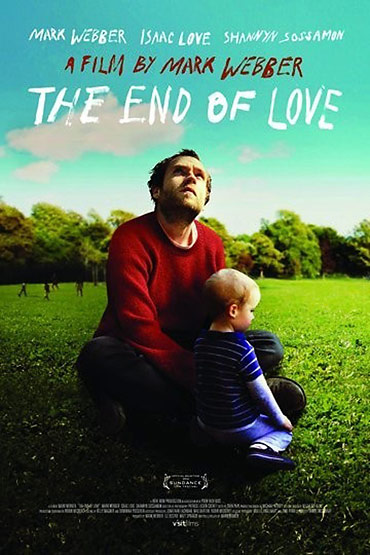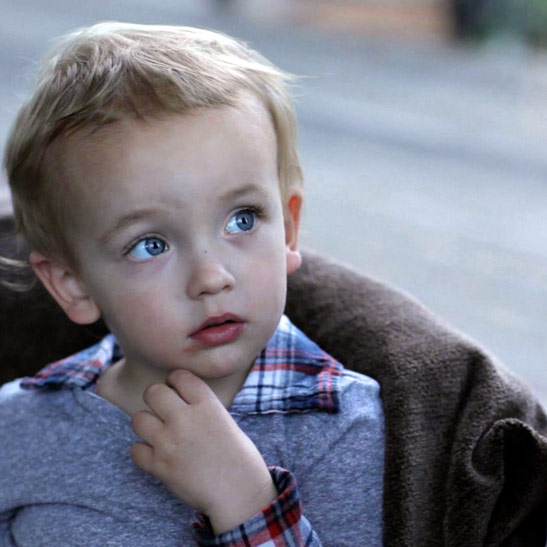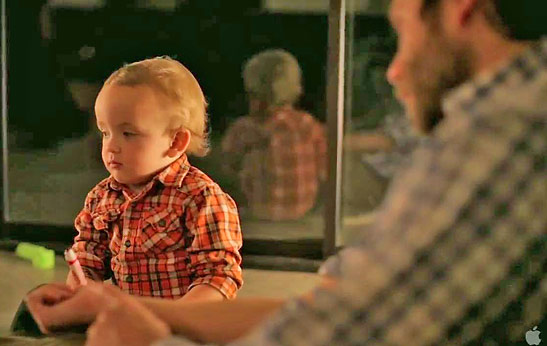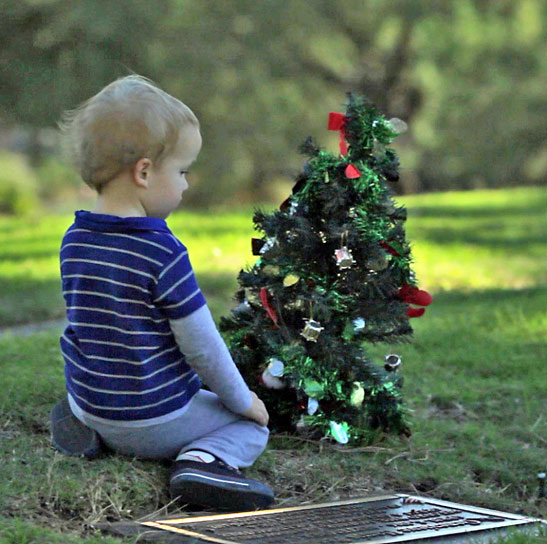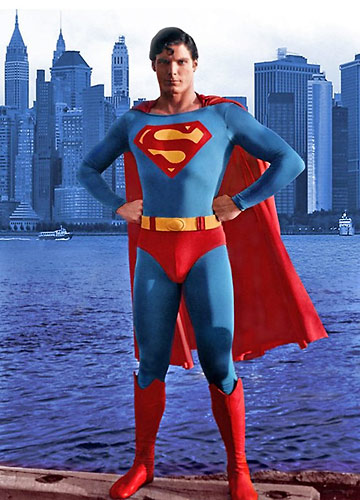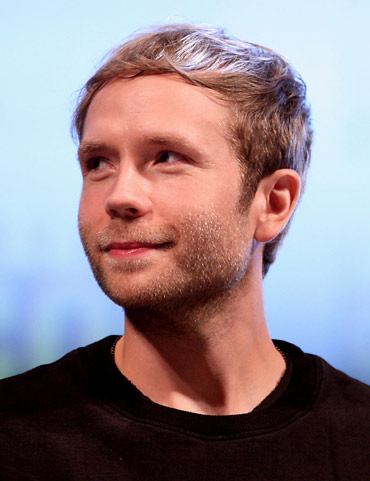 |
 |
|
 |

|
Up Close &
Personal
With Mark Webber Beverly Cohn
Webber recently sat down with your reporter for an exclusive interview and the following has been edited for content and continuity for print purposes. Cohn: When did you begin the writing process? Mark: I was a new dad when I started the writing process. I had just become a father and my days were spent with this little boy, my son and I became fascinated with the idea of making a movie with the most realistic father/son portrayal because that was my reality; being a dad.
Cohn: How old was Isaac when you started shooting? Mark: He was two. Just before two-and-a-half. Cohn: How long was the shoot and did you shoot as he got older? Mark: He was two-and-half throughout, but we spread it out over about two and half months because our shooting days with Isaac would be a half hour and that was it. So our days were short and it was all built around him, his moods, and his rhythm. I didn't have a crew and we made it for such a small budget, so I was able to extend it over a lot of time to protect him and also to be able to get the performances I needed.
Cohn: How did you get that extraordinary performance out of him? Mark: Basically, my DP (Director of Photography) Patrice (Cochet), is a dad as well and he had spent time with me and my son before and in the whole rehearsal period, it was basically Patrice coming over for a few weeks and making videos of us. He would just sit off to the side and film us and Isaac was aware of the IPhone that could record things and take pictures and eventually it got to the point where Patrice didn't really exist which is what I wanted to have happen, almost like you have this documentary similar to Cinema Verité style and that's what happened. It got to the point, where the whole process was second nature to Isaac that Patrice was always filming us. Cohn: Did you get Isaac to memorize lines or was it mostly improvised? Mark: Every moment between Isaac and me was entirely improvised and predominantly with all the other actors as well, but it was highly structured improv the idea being that you can only really improv effectively when you are very prepared. So, I created this character and lived in character essentially around him and created this story and the set ups so the stakes were there and the emotional tension was there. No matter what Isaac and me did, it would be right and would serve the story. It was really just to capture the innocence and essence of a real child at that age. Usually in films you see kids like the wise old kid who solves all the problems or the bratty kid and it's not a realistic portrayal. You were going through a personal break-up. Were you depressed at that time and did you feel doing this film was a way out of the depression? Mark: For me writing and filmmaking is a therapeutic process. It reflects themes that I'm going through at a time in my life and yes, I was going through a break up. I think, as most people are, I'm fascinated with love, relationships, and my daily life so I'm very inclined to make films about those things. They say write about what you know and this was definitely writing about what I knew and it's a very therapeutic process. It's really interesting for me as a filmmaker to go back and look at the films I've made and see where I was at that point in my life and also where my ideals were and the beliefs that I had and look at the ways I've grown and evolved and apply that to the next thing. So, yes, my son's mom and me had recently split and it became a catalyst for me exploring these themes that I'm fascinated with like grief and loss and carrying on, and parenting. Marriage is difficult under the best of circumstances and perhaps in Hollywood even more so. Is there something you learned from making this film that you can take with you to the next relationship? Mark: Yes for sure. Being present. I think that's the thing everyone struggles with in life. It's like your either thinking about the past or focused on the future and you're daily life, moment to moment, is suffering in some way because you're always there or you're always here. Being a good parent is really about being as present as you can at all times because children are. Isaac, ironically, is the best actor in the film because as an actor you're always trying to be present and be in the moment and seem truthful and authentic.
Mark: Children are literally going from one moment to the next completely enveloped in what is happening. It's interesting to see that the older you get how you lose that and how desires and grasping for things start to come in. You start to want that thing that's over there as opposed to enjoying what's happening with you right now. So, this movie was a way to realize it's all about being present and the more present I can be in my life and be right there with whoever I am with, including my son, the happier I'm going to be. Do you have joint custody? Mark: Yes. In reality the relationship between my son's mom and me is amazing. We're best friends. It wasn't this nasty, tumultuous thing. It was kind of like we knew we weren't meant for each other and probably never really were. We tried to make it work for the sake of our child and now as two adults who love our child and want to be great parents, let's make this work. It's completely 50-50 and she's still very much a part of my life. As we tell Isaac, many families look different. Some families have two dads. Some families have two moms. Some families live with their dad and their mom. It's really all he's ever known. As a child of a divorce as well, when it happens later on in life, it's a little harder as a parent to deal with that because for me, I certainly took it on and put it on myself and thought I was responsible somehow whereas with Isaac, all he's ever known is dad's house and mom's house. Did something surprise you during the shoot? Mark: Yeah. I anticipated on some level how hard this was going to be, but I was really surprised at just how hard it was to make this film. In a typical film you have a crew and your producers and people setting it up and you literally have sets. I was manipulating and taking real life environments and making them my set. We never slated. I would have to get people set and start living life over here and make sure they're filming and also be a dad at the same time. It was really taxing. I was also surprised to see how much of a challenge it was working with the other actors in this way because Isaac really became the high standard to live up to and it was quite an adjustment to make sure that we all maintained that same level of authenticity. As Isaac's dad, how did you protect him from the dark place your character was in? Mark: What I didn't anticipate was that I was so conscious of making sure that he didn't feel like we were doing some big thing; that he wasn't working, but that we were just living our lives. Although it is nuanced and subtle, I was living in a darker place around my child. Although they were for brief, little short bursts of time, there were enough to make a little impact on him and that was difficult so I was really hyperconscious of overcompensating with playing and going out and having fun and being my normal self again. We only worked in short bursts, but then as a product of that, he started to pick up on dad's kind of playing a game here and although he's two-and-a-half, and we never had a conversation about acting, and that he was acting, he started acting towards the end of the film. Also there's this one thing I would do a lot of the times. I would tell Patrice that I need a minute to kind of get focused again and literally the last couple of days, Isaac was doing something and looked up and said 'I need a minute.' (laughter) Does he have an agent yet? Mark: No. He was a non-voluntary participant in this thing. He wasn't like 'dad, I want to be an actor.' People love him in this film and I've sheltered him from that because he's just being himself. It would be the wrong route for him to want to be an actor because he's getting all this praise. I want him to want to be an actor because that's what he wants; not because people give him attention and love for it. So, no agent yet.
Was there a pivotal moment in your life when you knew you wanted to be an actor? Mark: As soon as I figured out that Superman wasn't real - that it was this guy Christopher Reeves playing Superman that seemed amazing to me and was the thing I wanted to do. I had kind of a harsh upbringing and the idea of being a movie star seemed so enchanting. It was like that must be the most amazing life. What was harsh about your childhood? Mark: I was born in Minneapolis but grew up in Philadelphia. I was homeless for two years with my mom from ten to twelve, living in abandoned buildings, like total, full on, crazy poverty. I grew up in extreme poverty. My mom had me when she was sixteen and we lived in a car for the first year of my life. I went through a lot of adversity and struggle in my life so the idea of being an actor and all that comes with it, seemed like the best possible thing. Also, on a daily basis, I was a natural performer in a way. I guess it was escapism. I was always imagining different things and creating characters in my head and things like that so it's like the world I became accustomed to. Did your character in the film parallel your own life?
Mark: Basically, for me, I was in a way at the end of my love, the love of my life so it has many different meanings. This man is very much in the end of his love… the love of his life is gone and the film is about how I have to come to ends to have a new beginning. Life is a cycle of ends and starts. What do you think the audience will take home? Mark: I'd like them to have an emotional reaction and to identify. The cool thing is that I've had a lot of single dads, which you know in the grand scheme of things, there isn't a tendency to focus on single fathers; it's usually single moms and it's been really beautiful for me having guys say hey, thanks for making a movie that really shows what parenting is and I want people to feel invigorated and that they're watching something different and new. As for me, using this relationship with my son, I've become really fascinated with realism and how to keep stretching and pushing that boundary for me as a filmmaker. You certainly have made a beautiful, poignant film and I wish you much luck in your personal and professional life. Mark: Thank you. |
This site is designed and maintained by WYNK Marketing. Send all technical issues to: support@wynkmarketing.com

|











